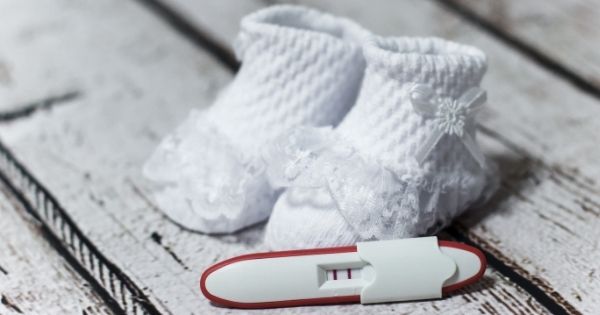Are you wondering whether you are pregnant or not? If for any reason you cannot take a pregnancy test, there are still ways to help determine if you are pregnant. Your body changes a lot when you are pregnant, and some of these changes start from the very beginning of pregnancy. Unfortunately, some symptoms are unnoticeable at the very beginning, but there are others that can be noticed a few days after conception. If you’re wondering what are some early signs you’re pregnant, then keep reading.

10 Signs You’re Pregnant
-
Missed Period
This is one of the main signs of pregnancy. When a pregnancy occurs, progesterone increases and the hormone HCG begins to increase. HCG stops your period from arriving. Most women find out they are pregnant once they realize their period didn’t show up. If you take a pregnancy test at this time, it would most likely be positive if you’re pregnant. This is usually 14 days after ovulation. If you are trying to find out if you are pregnant before you miss your period, then you may have the other symptoms.
-
Unusual Light Spotting
When the embryo implants in the uterine lining, sometimes the attachment can cause a little bit of bleeding. This bleeding is called implantation bleeding. It is usually light pink or brown in color. The bleeding is much lighter than your normal period, and usually lasts from a few hours to three day. If you notice bleeding right before your period is due, this could be a sign of pregnancy. Your period is usually accompanied with very bad cramps, bright red blood and heavy bleeding. If the bleeding has any of those characteristics, it is usually not implantation bleeding.
-
Light Cramping
Implantation sometimes causes light cramping. I have personally felt it in both my pregnancies. It feels like something is pinching your lower abdominal area. You can feel it in the middle, or on the side of your pelvic area. This does not mean you must feel it. Not all pregnant women do. The cramping is not similar to period cramps. They are uncomfortable; they shouldn’t actually hurt.
-
Nausea
This is what most moms refer to as morning sickness, but the feeling of nausea and vomiting can occur not just in the morning but throughout the entire day and night. It is usually caused by HCG, the pregnancy hormone. You might feel like you need to vomit but also be hungry at the same time. If you try to eat, your stomach may not accept it. The best thing to do is to eat smaller meals, eat slowly and many times a day. During my first pregnancy, I began feeling nauseous during the fourth week of pregnancy. During my second pregnancy, it began at 6 weeks.
-
Food Aversions
Food aversions are very common during early pregnancy. It occurs when you feel that foods have stronger smells than usuals. These smells cause nausea and a repulsion to food. You may have been obsessed with eating something before pregnancy, but now you might be disgusted by it. And the opposite is true too. You may begin eating things you have never liked. Food aversions are caused by changes in hormones during pregnancy. It can start very early. Unfortunately, sometimes it can last for the entire pregnancy, but it usually ends when you enter the second trimester.

-
Sensitive Breasts
Sensitive breasts is one of the earliest symptoms you may feel during pregnancy. It can be felt as early as one week after conception. It usually peaks during week 3 or 4 of pregnancy. Your breasts may feel like they are swollen, and they may ache when you touch them. This may also happen before your period comes, but usually if you are pregnant they will be more sensitive than usual. When you first conceive, your hormones will increase dramatically. It takes time for your body to prepare for breastfeeding, so it starts the process immediately. There are a few ways to decrease the discomfort. Some ways include wearing a baggier bra or loose shirts, and avoiding touching them.
-
Metallic Taste In Mouth
You may have a sour or metallic taste in your mouth throughout the first trimester. It is also caused by an increase in hormones, specifically an increase in the female hormone, estrogen. It usually peaks between 9 and 12 weeks of pregnancy. You can decrease the taste by chewing gum and eating foods with strong tastes, like citrus or sour food. Snacking very often can also make you feel better. This symptom is very common among pregnant women, but it could also be a symptom of other illnesses. So, if you have a metallic taste in your mouth, take a pregnancy test. If it is negative, go to a doctor to rule out other issues.
-
Elevated Basal Body Temperature
Basal body temperature is the temperature of your body when you first wake up before getting out of bed. Usually, it increases after ovulation. Many women who are trying to figure out when they ovulate use this method to confirm they have ovulated. If your basal body temperature stays elevated for 18 days past ovulation, then you are most likely pregnant. That is because it usually decreases when you get your period or are about to get it. The elevated temperature occurs because of the increase in the hormone progesterone. If you are pregnant, the progesterone level will not decrease as it usually does before your period. This will keep your temperature high and cause you to miss your period.
-
Excessive Bloating
Unfortunately, early pregnancy can cause excessive bloating. But, keep in mind, so can ovulation. If you feel bloated days after ovulation, it could be caused by an early pregnancy. As mentioned before, progesterone increases to make sure your body does not get rid of a pregnancy. When progesterone is increased, your menstrual period doesn’t come, and a pregnancy keeps growing. Unfortunately, the hormone progesterone can cause negative side effects. It affects your digestive system by slowing down the movement of food through your intestines causing gas and bloating.
-
Change in Bowel Movements
Due to the changes of hormones during pregnancy, your bowel movements may change. You may get constipation or diarrhea. Both have been reported during early pregnancy. As mentioned before, the hormone progesterone has an effect on the digestive system making stool more loose or more dry.
In Conclusion
When the embryo first implants, your hormone levels change quickly causing symptoms beyond normal. If you think you may be pregnant, and have at least one of these signs, take a pregnancy test. You can get a positive as early as 9 days past ovulation. The earlier you know you are pregnant, the faster you can prepare for your baby. Read and be informed, especially if you are a first-time mom, because that is the best way you can take care of your baby.

 About The Author
About The Author
Halimeh Salem is an English teacher and the founder of a mommy blog, Crying Toddlers. She has a passion for writing, and she founded her own blog to help women overcome the obstacles of pregnancy and motherhood. In her free time, she loves playing with her two children, Sama and Basem.

 Kaboutjie SA Mommy Blogs by Lynne Huysamen
Kaboutjie SA Mommy Blogs by Lynne Huysamen




